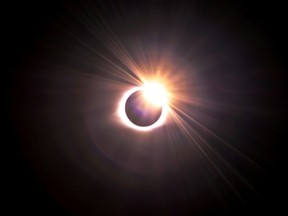Paul Bennett: Solar Eclipse Day: be prepared - kids of all ages will be ‘over the moon’
Solar eclipse is akin to Super Bowl for science museums, scientists, and amateur astronomers

Article content
Solar eclipse day is fast approaching and let’s hope we are prepared. A band of central New Brunswick running right through Fredericton is in its direct path, the excitement is building, and kids of all ages will be “over the moon.”
School districts in New Brunswick, like hundreds from Texas to Ontario and through Maine, will experience near-total darkness during the Monday, April 8 total solar eclipse and have elected to end classes early out of an abundance of caution. Schools in some districts in the United States, where the event hits earlier in the afternoon, will be closed for the entire day.
Shortening the school day is a pro-active move designed to keep students safe, both protecting their eyes from harmful solar radiation and ensuring they safely arrive home as thousands of gawkers and eclipse-chasing nomads clog the streets to catch an optimal glimpse of the rare cosmic event.
Starting at around 3:30 p.m. in New Brunswick and becoming a total eclipse by 4:30 p.m. or so, a small 185-kilometre band of the province will be plunged for about four minutes into total darkness. The moon will pass between the sun and the Earth, briefly blocking out some or all of its light in one of the most stunning celestial events known to mankind.
Most of New Brunswick and the Maritimes will be able to see a less-thrilling — but still quite unique partial eclipse. It will be, without exaggeration, one of the greatest learning opportunities, provided we have made preparations and have resisted the temptation to ‘shelter-in-place’ in the basement.
Making a decision on closing school came easier in New Brunswick than in other North American jurisdictions where the total eclipse hits earlier in the day. In Austin, Texas, where it hits at 1:36 p.m. local time, schools are closed for the entire day. Hundreds of schools elsewhere will follow suit, including some in Toronto’s York Region and other Ontario districts.
Some school districts in Ohio, where e-learning days are common, schools have declared “calamity days” and will revert to online learning. In Canton City Schools in Ohio, the decision was made to avert chaos on the roads and “traffic gridlock” around “dismissal times.”
Closing school or shortening the school day sparked a few lively public exchanges in Ontario where the eclipse hits around 3:30 p.m., a fairly common dismissal time. In school districts in and around larger cities, where most parents work to pay the rent and commute long distances, it became a ‘hot potato’ issue. A few, such as Toronto District School Board, moved a PD Day to April 8 so school could be cancelled for students, while the York Region public board opted to dismiss children early on eclipse day.
Ontario Education Minister Stephen Lecce sparked a minor furor when he intervened back in early March. “What I don’t support,” he said in a Queen’s Park media scrum, “is closing schools without giving access to their educators.” While he was not averse to substituting PD Days, he made one thing clear: “I am not comfortable with school boards unilaterally closing schools without an alternative for parents who have to work.”
Shortening the school day will be common in New Brunswick and that did not generate much of a backlash. In Anglophone West, all students in 70 of its schools will be dismissed three hours early. It was done to allow school buses and parents time to get the kids safely home before the spell of darkness.
School administrators in the province cancel school regularly or dismiss students early for snow days so they have a well-practiced routine. Two months before the eclipse, Anglophone West parents were provided with information about safety precautions and resources on how to protect the eyes from damage while viewing the eclipse.
Handy packets were prepared by the anglophone branch of the education department, tailored to various ages, for Grades 3 to 5, 6 to 8, and 9 to 12. In addition to providing resources, francophone sector schools on the eclipse’s path received “educational sessions” aimed at reaching students, families and school communities.
The solar eclipse is akin to the Super Bowl for science museums, scientists, and amateur astronomers. In the province’s capital city, Eclipse Fest Fredericton will seize the moment to educate the populace. With school districts missing-in-action, it’s impressive to see Science East, the Fredericton Public Library, and the Royal Astronomical Society of Canada, New Brunswick Branch, collaborating on integrated activities for children as well as adults.
One of the more ingenious educational responses was that of RASC NB member, David Hunter, utilizing his own invention, the Balloon Borne Solar Telescope (BBST). Launching the balloon in Florenceville-Bristol on the day of the total solar eclipse has spawned a whole series of spin-off events, including seven in-person livestream viewing centres broadcasting from Florenceville to the McCain Theatre in Woodstock, John Caldwell School in Grand Falls, and the civic centres in Hartland, Perth-Andover, and Plaster Rock.
Solar eclipses, like most celestial events, does generate its share of worry warts. School systems tend to foster those fears, particularly in elementary schools. With the solar eclipse bearing down upon us, it is important to be educated, aware and conscious of the risks to your eyes.
Protecting our youngest kids makes perfect sense and it’s difficult to know when to put more trust in children growing up before your eyes. Eclipse chasers know of the risks to damaged retinas, but can generate exaggerated fears with their tales of traffic jams, school bus back-ups and blocked emergency vehicle routes.
Some, like CTV News science and technology specialist Dan Riskin go too far. “It’s a great day for kids not to be in school,” he told viewers, “because it’s a very special day.” That assumes that most kids will take advantage of the opportunity, on their own, and would not benefit from the collective experience of learning along with their teachers.
Paul W. Bennett, Ed.D., is Director, Schoolhouse Institute, Adjunct Professor of Education, Saint Mary’s University, and Education Columnist for Brunswick News












Postmedia is committed to maintaining a lively but civil forum for discussion. Please keep comments relevant and respectful. Comments may take up to an hour to appear on the site. You will receive an email if there is a reply to your comment, an update to a thread you follow or if a user you follow comments. Visit our Community Guidelines for more information.